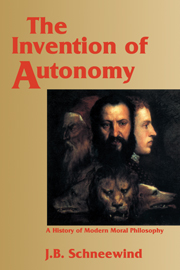Book contents
- Frontmatter
- Contents
- Preface
- Acknowledgments
- A note on references and abbreviations
- Introduction
- Part I The rise and fall of modern natural law
- Part II Perfectionism and rationality
- 9 Origins of modern perfectionism
- 10 Paths to God: I. The Cambridge Platonists
- 11 Paths to God: II. Spinoza and Malebranche
- 12 Leibniz: Counterrevolutionary perfectionism
- Part III Toward a world on its own
- Part IV Autonomy and divine order
- Epilogue
- Bibliography
- Index of names
- Index of subjects
- Index of biblical citations
9 - Origins of modern perfectionism
Published online by Cambridge University Press: 05 June 2012
- Frontmatter
- Contents
- Preface
- Acknowledgments
- A note on references and abbreviations
- Introduction
- Part I The rise and fall of modern natural law
- Part II Perfectionism and rationality
- 9 Origins of modern perfectionism
- 10 Paths to God: I. The Cambridge Platonists
- 11 Paths to God: II. Spinoza and Malebranche
- 12 Leibniz: Counterrevolutionary perfectionism
- Part III Toward a world on its own
- Part IV Autonomy and divine order
- Epilogue
- Bibliography
- Index of names
- Index of subjects
- Index of biblical citations
Summary
“Error is the cause of men's misery” So Malebranche opens his great treatise, The Search after Truth, published in 1674–5. The contrast between this and the opening reference of Grotius's Law of War and Peace to controversy as the problem to be handled by morality concisely indicates the basic difference between the natural law thinkers and the rationalist moral philosophers of the seventeenth century. What united the former, I have argued, was acceptance of a problematic centering on the permanence of conflict. What unites the latter is the thesis that ignorance and error resulting from failure to use our reason properly are what stand between us and a life of harmony and virtue.
The modern natural lawyers held that by reasoning from observable facts we can find out how to cope with the moral and political problems that beset our lives. Experience gives us the evidence we need in order to infer that God exists and cares for us. Part of what we learn from it is that God has made the proper structure of our common life independent of any larger cosmic scheme. Even if there is some divine harmony in the universe, we cannot appeal to it in determining how we ought to live. Once we understand that God governs us, the observable facts about ourselves in this world provide all the rational basis there can be for working out our proper direction.
- Type
- Chapter
- Information
- The Invention of AutonomyA History of Modern Moral Philosophy, pp. 169 - 193Publisher: Cambridge University PressPrint publication year: 1997



